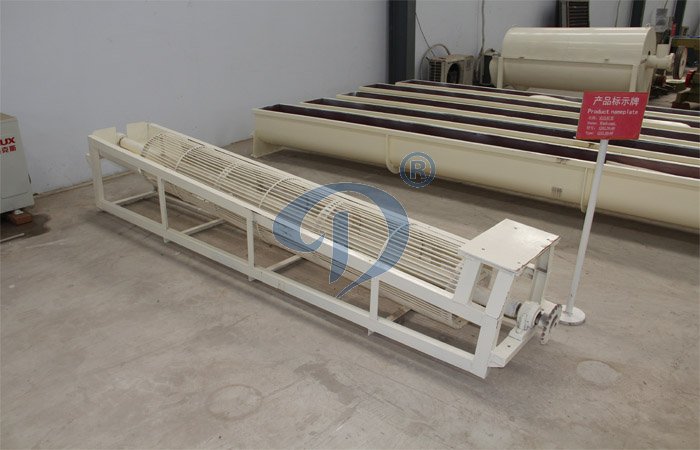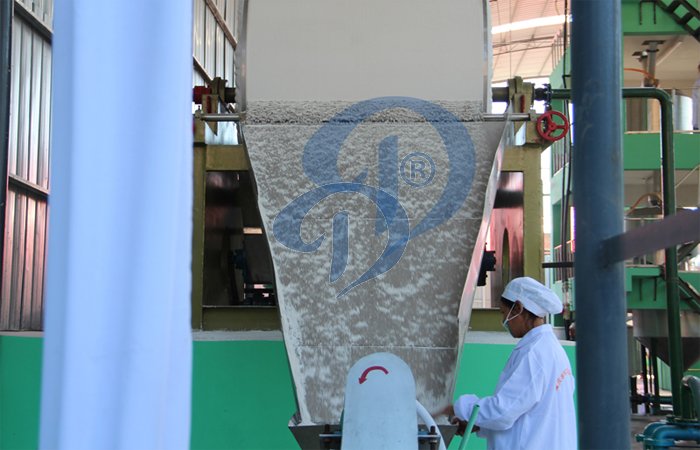 Tel/WhatsApp
Tel/WhatsApp
Potato starch production plant process

Potato starch production plant
Potato starch is starch extracted from potatoes . Potato starch is mainly used as material both in the manufacture of food and non-food products. In food processing a lot of potato starch is converted to starch hydrolysates and making different kind food . In non-food industries , such as wallpaper adhesive, for textile finishing and textile sizing, in paper coating and sizing, and as an adhesive in paper sacks and gummed tape. The potato starch has big demand in many countries .
If we want to get plent of potato starch , it will need the potato starch production plant to process starch from potato in industrial ways.
What is the potato starch production plant process ?
The potato starch production plant process is comprises the steps such as potato cleaning , potato wet milling , potato juice separation, starch extraction, starch milk refining, dewatering of refined starch milk and starch drying.

Potato starch
The detail description of potato starch making in potato starch production plant:

Potato cleaning machine
2. Potato wet milling of potato starch production plant

Potato starch production machine
Our company is professional supply the complete potato starch production plant machinery and equipment . If you want to start the potato starch making business , pelase contact with us wit your detail requirement .
-
 Henan Jinrui delivers attieke processing equipment to the customer in Côte d'Ivoire
Henan Jinrui delivers attieke processing equipment to the customer in Côte d'Ivoire
-
 Henan Jinrui Successfully Ships Cassava Flour Processing Line to Madagascar Client
Henan Jinrui Successfully Ships Cassava Flour Processing Line to Madagascar Client
-
 Henan Jinrui Advanced Cassava Starch Processing Equipment Wins Over Nigerian Food Processor
Henan Jinrui Advanced Cassava Starch Processing Equipment Wins Over Nigerian Food Processor
-
 Henan Jinrui Delivers Custom 1TPD Garri & Attieke Making Equipment to Benin
Henan Jinrui Delivers Custom 1TPD Garri & Attieke Making Equipment to Benin
-
 Henan Jinrui Secures Order from Benin for 1-Ton Daily Garri and Attieke Processing Machines
Henan Jinrui Secures Order from Benin for 1-Ton Daily Garri and Attieke Processing Machines
CONTACT US
DOING company offers cassava processing machine from single machine to the complete production line. If you want to get more details about cassava processing machine, please contact us:
- Do you want to buy machine?
- Yes, I want to buy machine
- No, I want to learn more in advance.
- What is your raw material?
- Cassava
- Potato
- Sweet potato
- Others
- 2. What is the final product you want to produce?
- Garri
- Cassava flour
- Cassava starch
- Cassava chips
- Attiekie
- Bammy
- Others
- 3.What is your capacity plan?
- Small scale garri machine
- 1ton per day
- 2tons per day
- 3tons per day
- 10tons per day
- 20tons per day
- Others
- 3.What is your capacity plan?
- Small scale
- 5tons per day
- 10tons per day
- 20tons per day
- 50tons per day
- 100tons per day
- Others
- 3.What is your capacity plan?
- Small scale
- 5tons per day
- 10tons per day
- 20tons per day
- 50tons per day
- 100tons per day
- 200tons per day
- 300tons per day
- Others
- 3.What is your capacity plan?
- Small scale
- Middle type
- Large scale
- What is your capacity plan?
- Small scale
- 5tons per day
- 10tons per day
- 20tons per day
- 50tons per day
- 100tons per day
- 200tons per day
- 300tons per day
- Others








